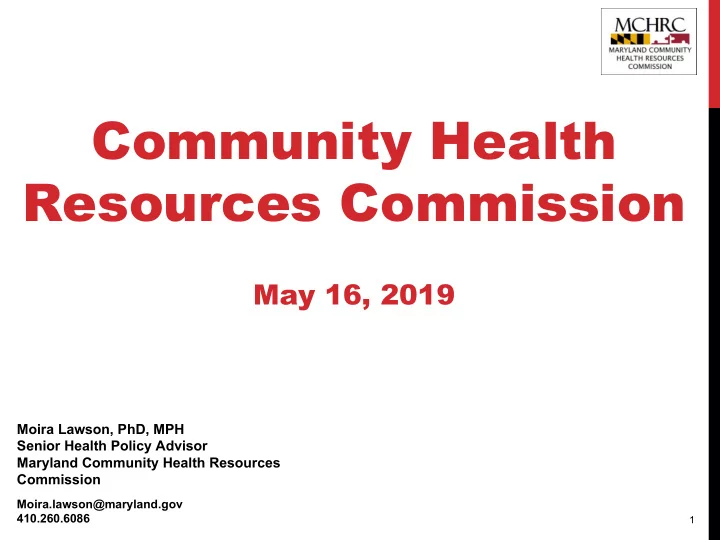

Community Health Resources Commission May 16, 2019 Moira Lawson, PhD, MPH Senior Health Policy Advisor Maryland Community Health Resources Commission Moira.lawson@maryland.gov 410.260.6086 1
BACKGROUND ON THE CHRC • Created by the Maryland General Assembly in 2005 • Legislative policy goals : • Expand access to health services in underserved communities; • Support programs that serve low-income individuals and vulnerable populations; and • Build capacity of Maryland’s safety net providers. • Statutory responsibilities: • Increase access to primary and specialty care through community health resources; • Promote emergency department diversion programs to prevent avoidable hospital utilization and generate cost savings; and • Facilitate the adoption of health information technology. 2
BACKGROUND ON THE CHRC • Eleven Commissioners are appointed by the Governor. Allan Anderson, M.D., Chairman Barry Ronan, President and CEO, Western Maryland Health System Elizabeth Chung, Vice Chair , Executive Director, Asian American Center of Frederick Erica I. Shelton, M.D. , Physician and Assistant Professor, Johns Hopkins University Scott T. Gibson, Vice President for Human School of Medicine, Department of Emergency Resources, Melwood Horticultural Training Medicine Center, Inc. Ivy Simmons, PhD J. Wayne Howard, Former President and CEO, Choptank Community Health System, Julie Wagner, Vice President of Community Inc. Affairs, CareFirst BlueCross BlueShield Celeste James , Executive Director of Anthony C. Wisniewski, Esq., Chairman Community Health and Benefit, Kaiser of the Board and Chief of External and Permanente of the Mid-Atlantic States Governmental Affairs, Livanta LLC Surina Jordan, PhD , Zima Health, LLC, President and Senior Health Advisor 3
IMPACT OF CHRC GRANTS • Since 2007, CHRC has awarded 233 grants totaling $70.7 million . Most grants are for multiple years. • CHRC has supported programs in all 24 jurisdictions . • Programs have collectively served more than 470,000 Marylanders . Most individuals have complex health and social service needs. • Grants awarded by the CHRC have enabled grantees to leverage $23.7 million in additional federal and private/ nonprofit resources. • Of this $23.7 million, $20 million has been from private and local resources. 4
COUNCIL ON ADVANCEMENT OF SCHOOL-BASED HEALTH CENTERS • Created in legislation approved by the Maryland General Assembly in 2015. • Charged with developing policy recommendations to improve health and educational outcomes of students who receive services from School-Based Health Centers. • Responsible for advancing the integration of SBHCs into health care and educational systems at the state and local levels and for promoting long-term financial sustainability of SBHCs. 5
COUNCIL ON ADVANCEMENT OF SCHOOL-BASED HEALTH CENTERS Chair - Kate Connor, M.D., MSPH Vice Chair – Barbara Masiulis, MS, CRNP Patryce Toye, M.D . – Maryland Assembly on School- Karen Williams – Federally-Qualified Health Center based Health Care Arethusa S. Kirk – managed care organization Barbara Masiulis, MS, CRNP – school-based health Jennifer Dahl – commercial health insurance carrier care center Diana Fertsch, M.D . – pediatrician Kate Connor M.D., MSPH – school-based health care center Ex Officio Members Uma S. Ahluwalia – school-based health care center The Hon. Clarence K. Lam, State Senate Jonathan Brice – Public School Superintendents Association of Maryland The Hon. Bonnie Cullison, House of Delegates Cathy Mary C. Allen – Maryland Association of Cheryl De Pinto, M.D., MPH – Maryland Boards of Education Department of Health Sharon Lynn Morgan – elementary school principals Mary L. Gable – Maryland State Department of of schools with a school-based health center Education Angel L. Lewis – secondary school principals of Michele Eberle – Maryland Health Benefit schools with a school-based health center Exchange Jean-Marie Kelly – Maryland Hospital Association Mark Luckner – Maryland Community Health Resources Commission Maura J. Rossman, M.D . – Maryland Association of County Health Officers 6
COUNCIL ON ADVANCEMENT OF SCHOOL-BASED HEALTH CENTERS • The Council has created three Work Groups, comprised of its members and additional members of the public. • Much of the substantive work of the Council is carried out in Work Groups. Systems Integration and Funding - add financial information to annual MSDE SBHC report and provide T.A. session around Medicaid billing with SBHC Administrators Data Collection and Reporting - work with MSDE to re- write the SBHC annual survey Quality and Best Practices - work with MSDE to update the SBHC Standards 7
CHRC GRANTS TO SUPPORT SBHCs • SBHCs are designated community health resources (eligible for grant funding). • 17 CHRC SBHC grants totaling $3.8 million. • Supports salary costs for practitioners (MDs, NPs, RNs, LCSWs, dental hygienists) and some administrative costs (office clerks/assistants). • More than 14,000 individuals served. • Delivery/expansion of primary care, dental, behavioral health, and obesity prevention services in 11 jurisdictions. • Metrics collected include: - Number of individuals served; - Number/types of services provided, i.e., vaccinations, dental sealants, etc.; and - ED visits by type: asthma, acute illness, and behavioral health. 8
CHRC GRANTS TO SUPPORT SBHCs Barbara Brookmyer, MD, Health Officer, Frederick County Deborah Somerville, RN, MPH, Coordinator, Office of Health Services, Baltimore County Public Schools Dr. Arlene Tyler, Medical Director for BMS School Based Health Centers 9
Recommend
More recommend